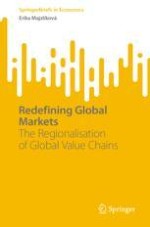2024 | OriginalPaper | Chapter
4. Regionalisation of Global Value Chains in Manufacturing
Author : Erika Majzlíková
Published in: Redefining Global Markets
Publisher: Springer Nature Switzerland
Activate our intelligent search to find suitable subject content or patents.
Select sections of text to find matching patents with Artificial Intelligence. powered by
Select sections of text to find additional relevant content using AI-assisted search. powered by
